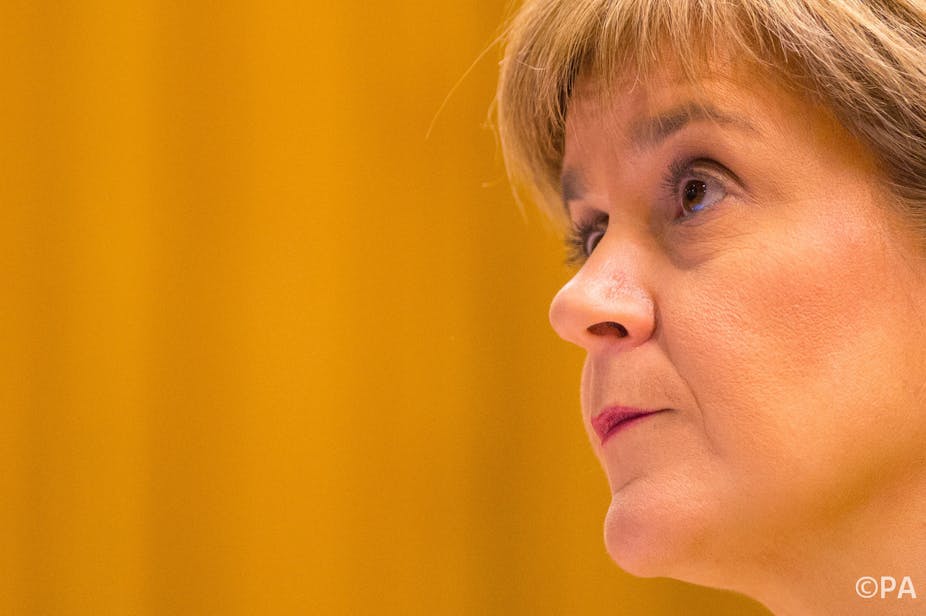Scottish first minister, Nicola Sturgeon, has been back in London offering an olive branch to English voters. The backdrop has been hostile to the Scottish National Party (SNP), to say the least – while the Conservatives have been tormenting Labour about being prepared to ride to 10 Downing Street on the coat-tails of the party that want to break up Britain, Vince Cable ruled out the Lib Dems participating in either a coalition or a looser arrangement with the SNP.
Ed Miliband followed suit by ruling out a Labour-SNP coalition. But, to the apparent frustration of many of his senior colleagues, he refused to rule out doing any deal whatsoever with the nationalists.
With the SNP seemingly the bogeymen for everyone else in Westminster, Sturgeon had a provocative message for them. She wanted to use the forecast big surge in SNP MPs to deliver “progressive change across the UK,” including using her party’s experience of thrashing out deals policy by policy during its years of minority government in Scotland in 2007-11 to help reform the UK’s most powerful institutions.
On the question of power-sharing with Labour, Sturgeon said:
I can’t for the life of me see why Labour wouldn’t want to contemplate working with the SNP to keep the Tories out of office. As long as there are more SNP and Labour MPs than there are Tory MPs we can lock the Tories out of government. There is no question about that.
Barbarians at the gates?
The idea that the Scottish nationalists are the barbarians at the gates of Westminster shows little understanding of the party that has governed Scotland for the last eight years. Understanding why the SNP has become so popular and what it is likely to do if it holds the balance of power requires an informed and sober assessment.
The SNP will do well for two main reasons: the overhang from the referendum and becoming relevant in a UK election. A large part of the 45% who voted Yes in the independence referendum and most of the 45% who voted SNP in the Holyrood elections in 2011 (not the same 45%) has been translated into an SNP vote for Westminster.
In addition, some No voters view a large SNP presence as being in Scotland’s interests. Labour’s past Westminster support was probably inflated by those who were sympathetic to the SNP but who viewed this small party as irrelevant in the battle for Number 10. But the referendum has acted as a bridge, allowing many former Labour voters to move to the SNP.
As SNP support has surged since the referendum, it has become clear that it is no longer a wasted vote. Few believe the Labour refrain that voting SNP will let the Tories win.
The Conservative UK-wide strategy of portraying Alex Salmond with Ed Miliband in his pocket has two aims: to undermine Miliband in England, but help the SNP in Scotland. Of course this risked drawing attention to a party that traditionally struggles to get noticed at Westminster elections, but clearly the Conservatives saw this as being worthwhile. They wouldn’t do it if they were genuinely worried about the likelihood of the break-up of the UK, which somewhat undermines the force of their argument.

The prospect of the SNP sharing power at Westminster has an obvious appeal for many Scots. When the SNP formed a minority government in 2007 its opponents – and most commentators – expected it would be out of office within a year. This was based on a failure, sometimes a refusal, to understand the party.
Despite having only 47 of Holyrood’s 129 Members, the SNP took to minority government with ease. It understood the importance of majority building, issue by issue. The party’s opponents suggest that the party wins elections on a populist agenda. But during the 2007-2011 administration, its policies required the support of others. A populist policy like freezing council tax is a classic example.
During its minority-government period, the reality is that the SNP governed pragmatically and effectively. It understood the limits of its power and how to maximise its impact. And crucially, it understood that it needed to govern responsibly. In short, Sturgeon’s rhetoric about the benefits of minority government should not be dismissed lightly.
Where we go from here?
If the SNP does hold the balance of power after the election, it creates opportunities and challenges for the party. In any negotiation with Labour, the SNP is likely to insist on concrete benefits – but these will not be restricted to Scotland.
Salmond and Sturgeon genuinely relish the prospect of delivering social justice for people across the UK – Sturgeon’s notion of a progressive alliance of Labour, Plaid Cymru, Greens and SNP is more than just political provocation.
At the same time, the SNP’s leadership is too shrewd to turn this election into another independence referendum. It knows that over the coming years it can make the case for more powers but that there are dangers in demanding another referendum too soon.
The biggest threat to the SNP is itself at the moment. It will suffer electorally if it misinterprets a successful election in May as signalling the electorate’s willingness to support independence. Even if polls showed support for independence increasingly on the rise, the SNP would be unwise to read too much into any them. Otherwise spring 2015 could well go down as the high watermark in a movement that has been in the making for a very long time indeed.

